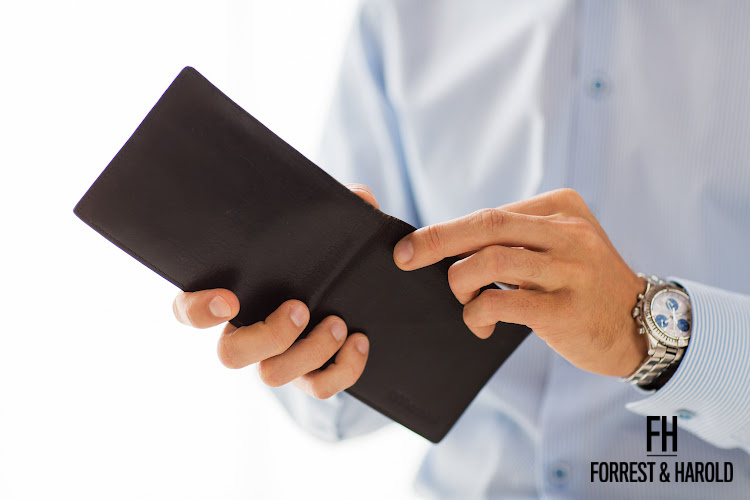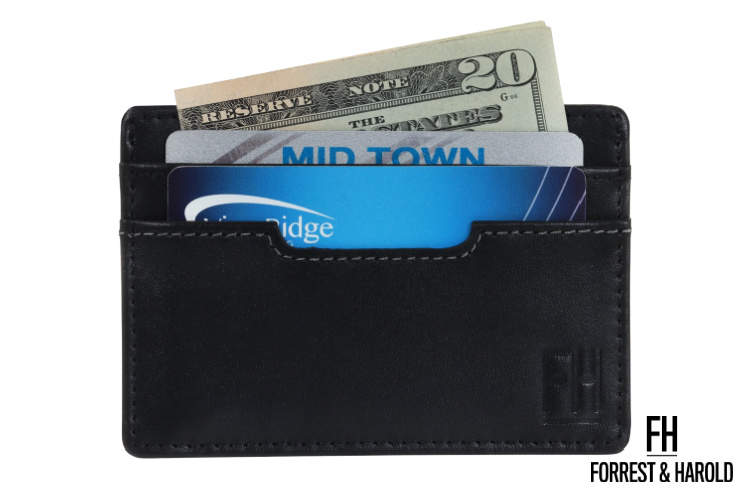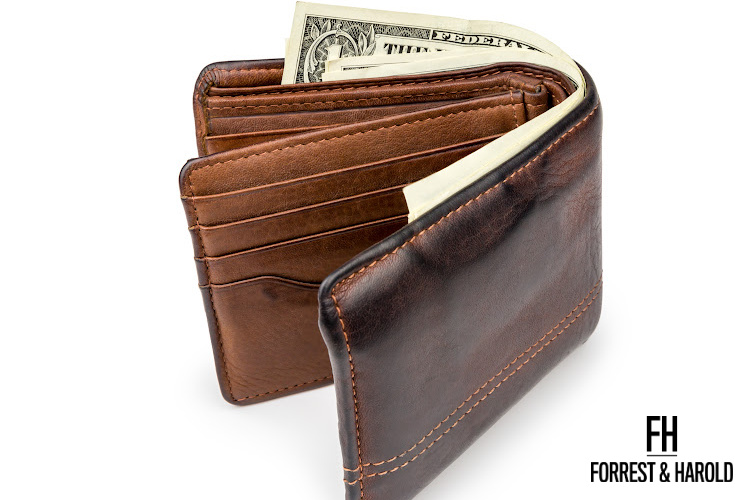There I was, at the ticket kiosk in a foreign city, trying to purchase my way back home when it happened. The card reader declined all three of my credit cards. In that moment, clutching nothing but plastic and digital promises of money, I realized just how important having physical cash could be.
We live in an increasingly cashless society with various payment options from debit cards to Apple Pay making our lives more convenient than ever before. However, does this mean we should ditch hard cash entirely? Is there such a thing as how much is too much cash in wallet? It's high time we examined these questions.
In this piece you'll get practical advice on how much green stuff you should carry around for emergencies while also considering your day-to-day spending habits. From leveraging credit cards effectively to understanding the rise of digital payments - it’s all here!
Table Of Contents:
- The Right Amount of Cash to Carry in Your Wallet
- Pros and Cons of Carrying Cash
- Leveraging Credit Cards Effectively
- Digital Payments and Their Growing Popularity
- Choosing the Right Wallet for Your Needs
- FAQs in Relation to How Much is Too Much Cash in Wallet?
- So, how much cash should a man have in his wallet?
The Right Amount of Cash to Carry in Your Wallet
How much cash is too much in a wallet? It can be difficult to determine how much cash is ideal for a wallet, as it largely depends on one's spending patterns and individual inclinations. However, most financial experts recommend carrying enough for a day's worth of expenses.
Analyzing Your Spending Habits
Determining the amount of cash to carry is largely dependent on your daily expenses. Averaging $50 per day in expenditure is a good sum to carry on your person.
Yet it isn't always about what you usually spend; sometimes it's also about being prepared for unexpected costs. Think emergencies or scenarios where cards aren't accepted - having some hard cash might save the day.
Emergency Cash Needs
In addition to your typical spending money, it's wise to reserve some extra funds for unforeseen situations. Anand Talwar recommends keeping this emergency fund at or below $100.
This gives you flexibility without making your wallet bulge with dollar bills. Remember: finding the right balance helps ensure safety while providing peace of mind during those 'just-in-case' moments.
Pros and Cons of Carrying Cash

Having cash on hand can be like having a two-sided blade. On one hand, it's handy in situations where credit cards aren't accepted or when card reader issues arise. There are local businesses that prefer cash, and splitting bills with friends becomes easier.
However, having too much hard cash also presents risks. It's prone to loss or theft - unlike debit cards which come with security features like PINs for protection against unauthorized use.
When Cash Is King
Cash shines in certain scenarios such as road trips or visits to small-town establishments that only accept cash. Even tipping your delivery person is often smoother with dollar bills at hand. Recent studies, though, show an increasing shift away from carrying large amounts of money; 41% consumers did not make any purchases using cash last year.
Balancing convenience and security is key here. A rule of thumb? Carry around $100 - enough to cover emergencies but not so much that you'd be devastated if lost.
Leveraging Credit Cards Effectively

When used wisely, credit cards can offer more than just a payment method. They're a ticket to perks and rewards too. Take the Citi Custom Cash Card, for instance. It gives 5% cash back on purchases in your top spend category each billing cycle, up to $500 spent (then 1%). Now that's an incentive.
The role of credit and debit cards has shifted from being mere substitutes for cash to becoming financial tools. When you carry less hard cash around, these cards can help manage daily expenses effectively.
However, managing your balance is crucial too. You don't want to end up paying unnecessary interest due to unchecked spending habits or missed payments during the billing cycle.
And here's another benefit - security features are generally stronger with plastic money compared to physical currency. If lost or stolen, card transactions can be blocked immediately providing some peace of mind.
To sum it all up: use your card wisely. Keep tabs on your spending habits and make full use of reward offers where possible while ensuring security measures are followed diligently.
Digital Payments and Their Growing Popularity
The world of payments has seen a seismic shift with the rise of digital payment methods like Apple Pay.
This transition from hard cash to virtual wallets is not just about convenience, but also security.
A survey conducted by the Pew Research Center showed that in 2023, 41% of shoppers did not pay with money, a jump from 29% in 2018. This indicates an increasing trend towards using digital payment methods. That's an impressive leap compared to 29% in 2018. The trend clearly indicates that more people are embracing digital payments.
Mobile payment apps have pros and cons though. On one hand, they offer ease of use, instant transactions, and reduce our need for physical money. However, with the use of these apps comes a need for increased caution to ensure that personal data is safe from potential risks.
In this evolving landscape where cards are getting replaced by smartphones at checkouts everywhere - from grocery stores to coffee shops - it's important we keep our devices secure.
Digital wallets can be locked down with biometrics or passcodes which makes them harder for thieves than traditional wallets full of dollar bills.
Choosing the Right Wallet for Your Needs

Selecting a wallet is not just about design or brand, but also practicality. Different types of men's wallets cater to varied needs and lifestyles.
Size and Capacity of Your Wallet
The size and capacity should match your carry habits. If you prefer cash, opt for billfolds with ample space for dollar bills. For card users, go for wallets that can securely hold multiple credit cards without bulging.
Durability and Quality Materials in Wallets
A wallet isn't merely a fashion accessory; it's an investment. Look out for those made from quality materials like leather which offer durability while exuding elegance.
Forrest & Harold: A Reliable Option
If you're looking for all these features packed into one stylish package, consider Forrest & Harold wallets. Known for their top-notch construction, they deliver on both form and function making them ideal companions whether you're at a business meeting or road trip.
FAQs in Relation to How Much is Too Much Cash in Wallet?
How much cash should I carry in wallet?
Your daily expenses and spending habits dictate your cash needs. Personal finance gurus suggest carrying $100 to $300.
How much cash is too much cash to carry?
Anand Talwar suggests keeping at or below $100, balancing convenience and financial security.
How much cash does the average American have in their wallet?
The amount varies widely. However, with a growing trend towards digital payments, many Americans now keep less physical money on hand.
What is a good amount of cash to keep on hand?
A day's worth of expenses is advisable for emergencies where electronic payments are not accepted.
So, how much cash should you have in your wallet?
That's the question we tackled. And now, you're armed with some practical insights.
Analyzing your spending habits helps decide how much cash to carry. Remember that a day's worth of expenses as emergency fund could be a lifesaver when card reader issues strike.
Cash has its place but so do credit cards and digital payments. Each comes with pros and cons, security features being crucial for both physical and electronic wallets. Check out this comprehensive guide in carrying cards in your wallet: https://forrestandharold.com/blogs/news/what-cards-should-you-not-carry-in-your-wallet-for-safety
Selecting the right wallet also matters - one that can hold not just dollar bills but debit cards securely, while fitting into your lifestyle seamlessly. Choose the best wallet for you through our helpful guides:
How to Choose the Best Wallet
What Color Should Your Wallet Be?
Secured Wallets: Your Guide to RFID Blocking and Other Security Options
How to Check a Wallet's Durability
Carry cash wisely, leverage payment options smartly and navigate this increasingly digitized world with confidence!

